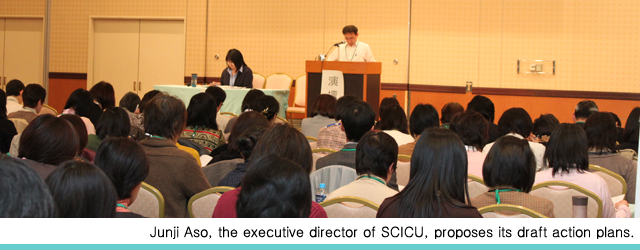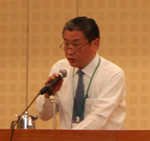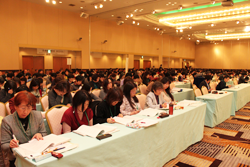Annual Conference to Discuss the Action Plans

On March 21, The Seikatsu Club Consumers’ Cooperative Union (SCCCU) and the Seikatsu Club Insurance Cooperative Union (SCICU) held an annual conference to discuss their action plans for fiscal year 2012, which include the “Joint Action” to promote SCCCU’s “consumer materials” (private brand products), and the preliminary work to launch SCICU’s first insurance business, named “Step Kyosai.” (Posted on April 10)
The Biggest Theme for the 350,000 Members of SCCCU
“Let’s Eat Our Own Consumer Materials!”

“At last year’s annual conference for action plans, the first conference after the Great East Japan Earthquake, I said that our first priority had to be placed on our work to support our producers who were affected by the disaster,” said Koichi Kato, Chairperson of SCCCU, when he initiated the discussion on the draft action plans for fiscal year 2012. “Such support should be facilitated, I added, by promoting our six major consumer materials (rice, pork, beef, poultry, vegetables, and milk). The reality turned out to be quite different. I am especially concerned by the fact that average monthly purchases by our members has declined to 20,500 yen (US$260). Let me confirm the significance of our biggest challenge for the next fiscal year, which is to unify our purchasing power,”
Kato also called for a discussion on a number of other topics, such as SCCCU’s own standard for radioactive substances (which was supposed to be introduced temporarily in April) and the Trans-Pacific Partnership (TPP) free trade agreement.
“We have to work cooperatively on the issue of radioactive substances,” said Yoshiyuki Fukuoka, the executive director of SCCCU, as he explained the preamble of the draft action plans, and added, “The Trans-Pacific Partnership will ruin Japanese Kyosai (insurance cooperatives) and our food safety standards that we have worked very hard to foster. Let’s take a firm stand against TPP by working with other cooperatives.”
Farmers and Producers: Essential to Enhance Food Self-Sufficiency
There are five items in the basic principles for fiscal year 2012, which include (1) enhancing food self-sufficiency for sustainable production and consumption, and (2) establishing a sustainable and recycling-based society through environmental protection.
The “Joint Action for Promoting the Purchase of Consumer Materials” (hereafter referred to as “Joint Action”) is one of the pillars of the first principle mentioned above. A culmination is planned for the latter half of the fiscal year. The Joint Action was under discussion in 2010 as a “plan to reorganize the business structure in order to build sustainable production and consumption”. The plan went through some adjustment after the earthquake and SCCCU proposed a new action plan, entitled“Let’s Eat Our Own Consumer Materials!” that enables every member to participate as an active player.
Nine items in the principles of action, which are based on the basic principles, include (1) a supply plan for fiscal year 2012, and (2) enhancing the ability of our collective purchase movement to solve social problems.
It is essential to have very strong ties between consumers and producers in order to strengthen purchasing power. SCCCU has been working with farmers in Shonai (Yamagata), Tochigi, and Nagano on various activities to raise food self-sufficiency. In order to share these experiences, the establishment of a preparatory group for a “Farmers Forum” was proposed. This is also designed to raise awareness about SCCCU’s activities with farmers and get more farmers and other stakeholders involved in the activities for sustainable farming.
“JA (Agricultural Cooperative) Takikawa in Hokkaido is encouraging farmers around its area to grow non-GM canola. We support this move. In addition, we are planning to work with the Green Co-op Union (in Kyushu, the southern island of Japan) to buy non-GM canola sustainably from Tasmania, Australia,” said Fukuoka. He also proposed a plan to raise food self-sufficiency by creating production bases for processed food ingredient.
SCCCU’s Newly Introduced Standard for Radioactive Substances

At three concurrent sessions, members discussed topics including the SCCCU’s “Seventh Milk Policy”, the new standard on radioactive substances, and the Joint Action.
The “Seventh Milk Policy” articulates SCCCU’s strategy to diversify its milk consumption. After Yokouchi Shinsei Milk and Shinsei Dairy (both subsidiaries of SCCCU) merged, SCCCU now has one milk company and three factories of its own. Under this new structure, SCCCU is planning to develop new varieties of dairy products, including non-homogenized milk, low-fat milk, milk in a 200 ml bottle (only a 900 ml bottle is currently available), milk packaged in a paper carton, and milk beverages (such as milk coffee) after fiscal year 2013.
“We have to investigate the reason why the consumption of our milk is falling.” “Discussion with producers is needed to evaluate the relevance between milk price and our purchasing power.” “I would like to know more about non-homogenized milk,” were requests members put before the board of directors. In respond to these requests and opinions, Fukuoka answered, “We have to find ways to reduce the price of the milk while feeding cows with non-GM feed. We are planning to develop non-homogenized milk initially in a 200 ml bottle, and then in a 900 ml bottle.”
“The new radioactive substances standard was elaborated on the basis of consent from both members and producers,” explained an SCCCU staff member who is working on the standard. One of the members pointed out that the standard is based on very abstract grounds. “There are a lot of unknown factors about internal exposure,” the staff member responded. “Under such circumstances, we have tried to find an acceptable level for both consumers and famers.”
Not Simply a Discount Campaign
Later, the discussion on the radioactive substances standard continued at the plenary session. “We human beings inherently have some radioactive Potassium-40 in our bodies. In addition, we are being forced to ingest Cesium-134 and 137. We would like to minimize the acceptance level, hopefully to zero tolerance, but this is impossible in reality. Unfortunately, we need to accept this minimum level, which is far stricter than the government standards. I hope our new standard will encourage our members to increase their purchases,” said Hiroshi Tsuchida, manager for quality control.
In regard to the “Joint Action”, a question was raised about the reason behind the decrease in consumption since 2008. However, both the plenary and concurrent sessions were full of enthusiasm for the success of the action recognizing the need for business restructuring. While some members asked the board of directors to clarify the difference between the Joint Action and a discount campaign, other members declared that “The Joint Action is designed to recognize the value of our movement. It will be crucial to come into contact with as many people as possible and tell them about this value. We have to start from this spring instead of waiting until autumn.”
Seikatsu Club Insurance Cooperative Union (SCICU): Our Own Insurance Cooperative Business
Under the current revision of cooperative laws and the Insurance Business Act, the Japanese government is tightening regulations on insurance cooperatives, claiming that they are identical to private insurance companies. On the other hand, the Seikatsu Club is promoting activities in its local areas to foster human ties and mutual help based on cooperative values and principles.
SCICU is preparing to receive approval for the “Step Kyosai”, which will mark our first insurance business. In order to make this happen, we plan to hold a symposium entitled “Revision of Consumers Cooperative Law, International Year of Cooperatives, TPP, and Insurance Cooperatives.”
In its principles of action, SCICU has set a goal of 120,000 insured members, an increase of 4600.
Following the discussion, SCCCU and SCICU will re-examine their draft annual report and draft action plans. The final drafts will be put on the table at their annual General Conference in June.
生活クラブをはじめませんか?
42万人が選ぶ安心食材の宅配生協です
ウェブ加入限定 無料プレゼント






